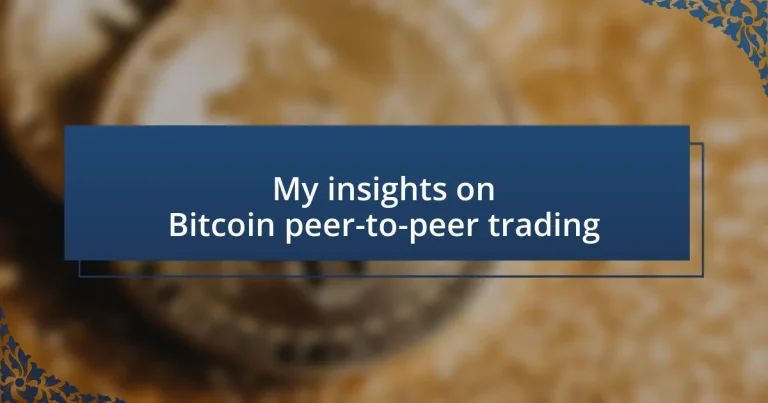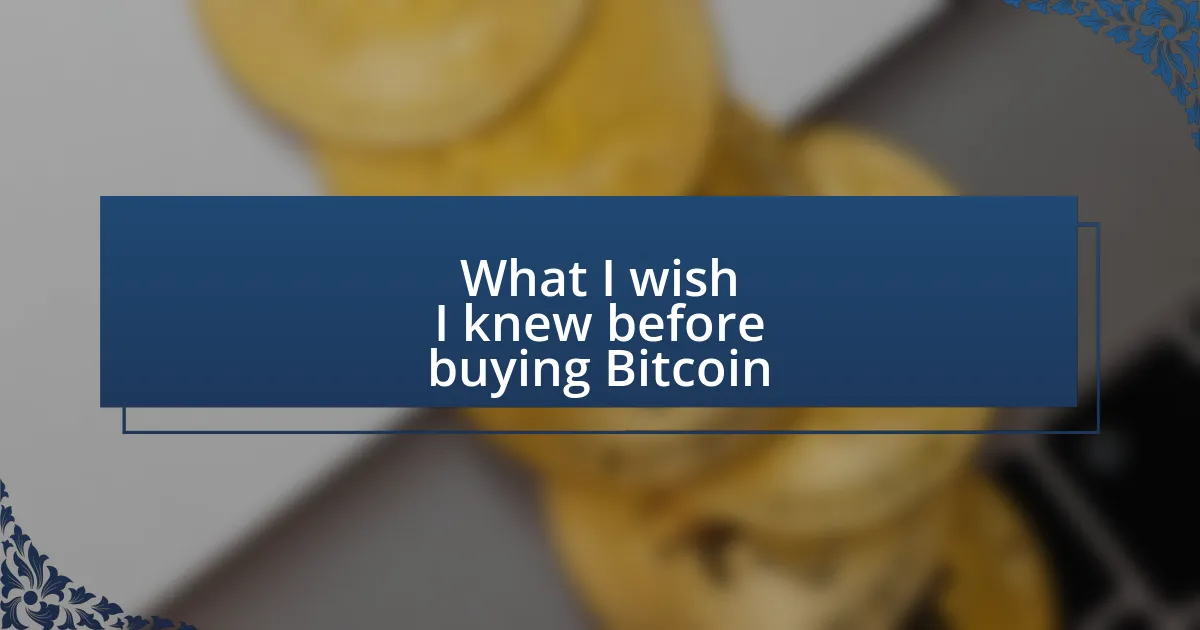Key takeaways:
- Bitcoin peer-to-peer trading allows direct interaction between buyers and sellers, promoting flexibility and personalized experiences.
- Benefits include reduced fees, increased privacy, and flexible payment methods, enhancing user satisfaction compared to traditional exchanges.
- Key platforms for peer-to-peer trading include LocalBitcoins, Paxful, Bisq, Hodl Hodl, and WazirX, each offering unique features for traders.
- Prioritize safety by choosing reputable platforms, maintaining clear communication, and being cautious with personal information during trades.
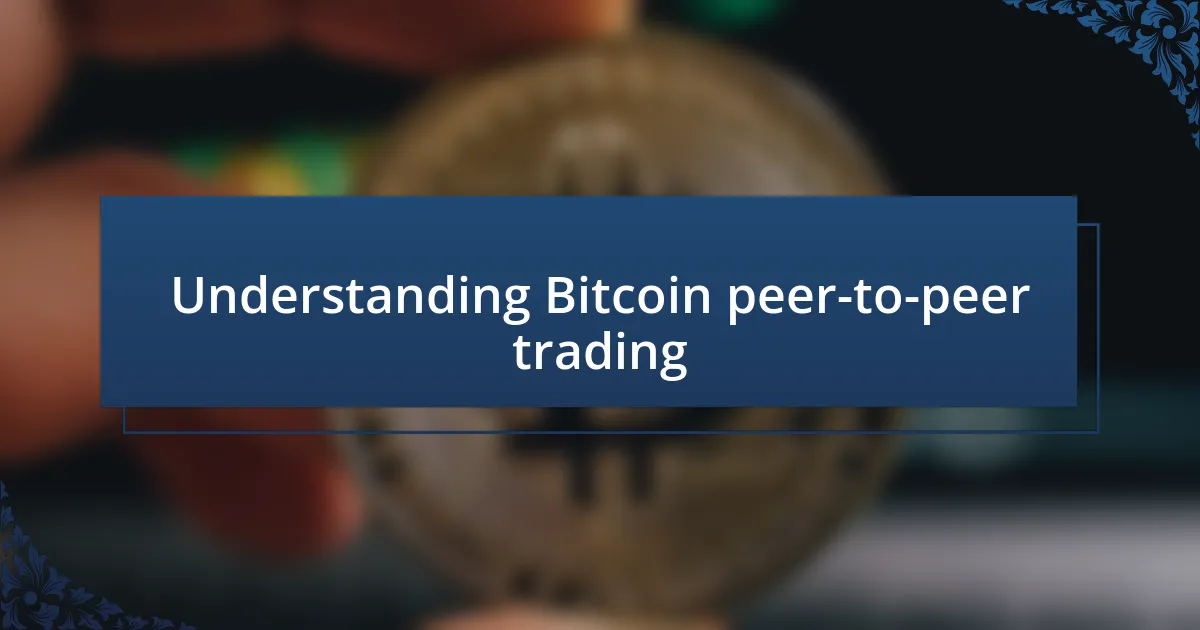
Understanding Bitcoin peer-to-peer trading
Bitcoin peer-to-peer trading is essentially a decentralized method where buyers and sellers interact directly, bypassing intermediaries like banks or exchanges. I remember the first time I engaged in a trade; it felt liberating not having to rely on a third party. Have you ever thought about how empowering it is to conduct transactions on your terms?
In this model, users can set their own prices and choose their preferred payment methods, which adds a level of flexibility that traditional trading platforms often lack. One particular trade I participated in involved negotiating with the seller over multiple channels, ultimately leading to a deal that felt more personalized and tailored to my needs. Doesn’t that sense of ownership resonate with the very essence of what Bitcoin stands for?
Moreover, peer-to-peer trading can foster a strong sense of community among participants. I’ve met fascinating individuals who share a similar passion for cryptocurrency, making it more than just a financial transaction; it becomes an exchange of ideas and knowledge. Have you ever experienced a moment where a simple trade led to meaningful connections? It’s the kind of experience that enriches the entire trading journey.
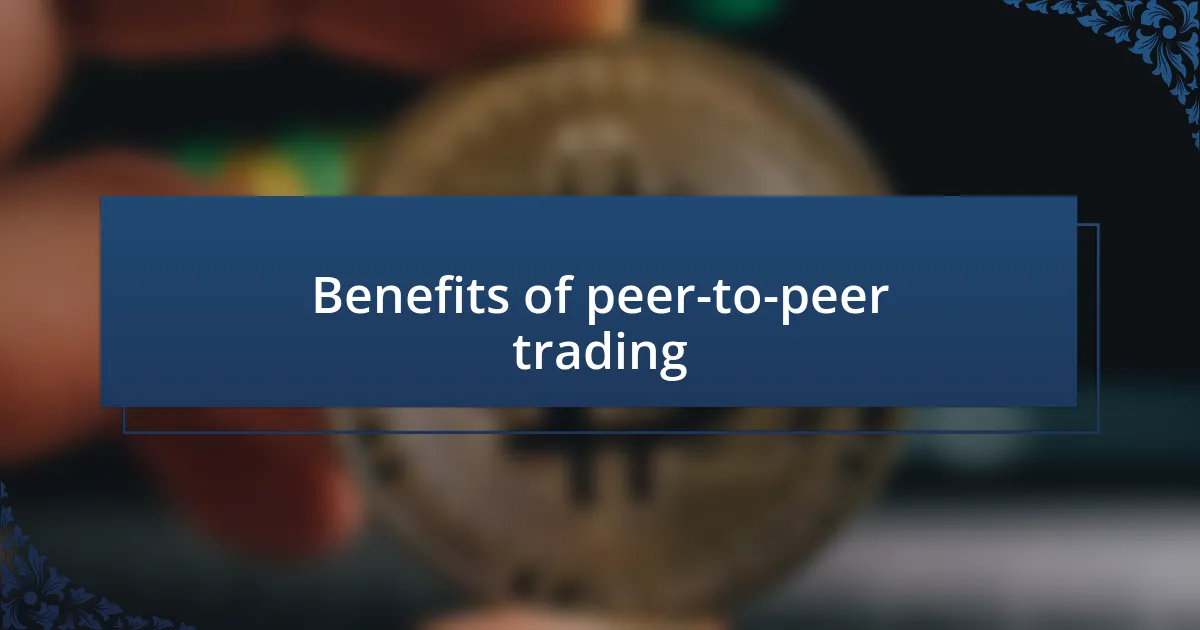
Benefits of peer-to-peer trading
Peer-to-peer trading offers several benefits that make it an attractive option for cryptocurrency enthusiasts. One of the primary advantages is the reduced reliance on centralized exchanges. I recall a transaction where I avoided hefty fees by opting for a direct trade with another individual. It was refreshing not to see those extra charges eating into my profits. Isn’t it great when you can keep more of your hard-earned Bitcoin?
Another significant benefit is the increased privacy. In my experience, traditional exchanges often require extensive personal information, which can feel invasive. However, with peer-to-peer trading, I was able to engage without sharing all my details, allowing me to maintain a sense of security. Don’t you feel a sense of relief when your information stays under wraps?
Finally, the flexibility in payment methods is a game-changer. I once traded some Bitcoin for goods directly, something traditional platforms might not facilitate smoothly. That experience was not just a simple exchange; it became a way to support a local business while promoting cryptocurrency usage. How empowering is it to make such impactful choices through your trading activities?
| Benefit | Description |
|---|---|
| Reduced Fees | No intermediaries lead to lower transaction costs. |
| Increased Privacy | Users can trade without extensive personal information. |
| Flexible Payment Methods | Ability to choose diverse payment options suited to individual preferences. |
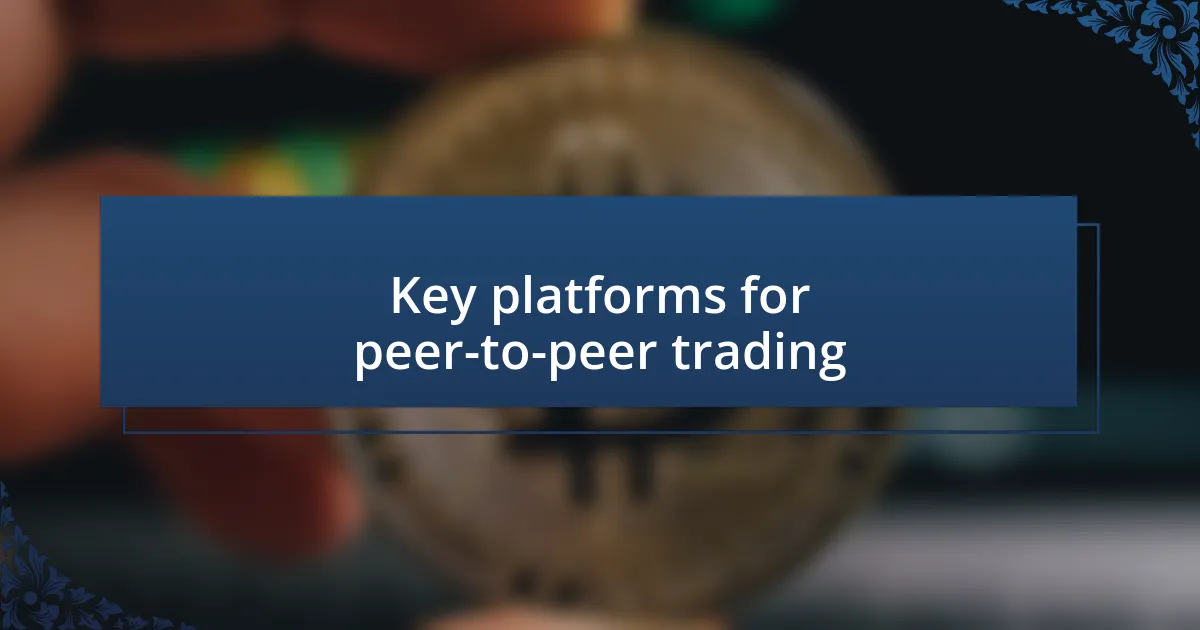
Key platforms for peer-to-peer trading
When it comes to peer-to-peer trading, several platforms stand out as reliable options that cater to different user needs. I’ve found that each platform has its unique features that can enhance the trading experience. For instance, I once used LocalBitcoins, which connects buyers and sellers directly, making the process feel very community-driven. The anticipation of finding the right buyer or seller can be quite exhilarating!
Here are some key platforms you might want to consider:
- LocalBitcoins: A well-established platform known for its user-friendly interface and variety of payment options.
- Paxful: Offers a vast array of payment methods, allowing for flexibility and accessibility tailored to individual preferences.
- Bisq: A decentralized exchange that emphasizes privacy and security, letting users trade without the need to trust a third party.
- Hodl Hodl: Focuses on privacy and does not require KYC (Know Your Customer) verification, attracting users keen on anonymity.
- WazirX: Provides a P2P trading option with an integrated escrow service, ensuring secure transactions between users.
Using these platforms, I’ve experienced the thrill of connecting with fellow Bitcoin enthusiasts in negotiation, each trade feeling like part of a larger movement rather than just a transaction. These interactions often lead to friendships and shared insights that you simply cannot get from centralized exchanges.
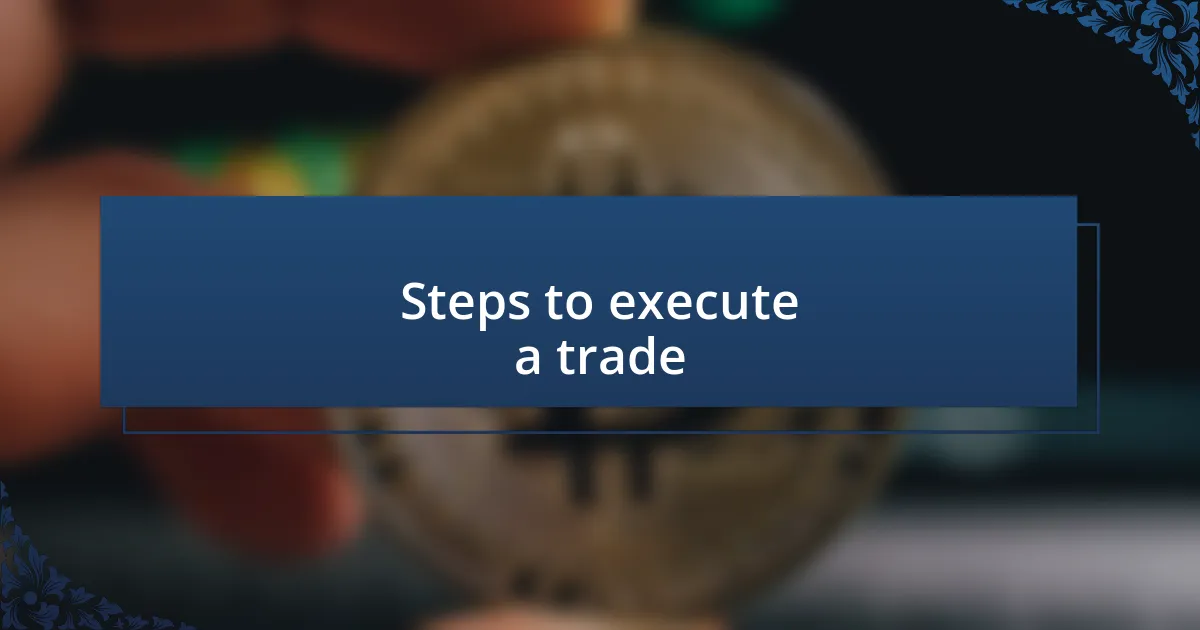
Steps to execute a trade
Executing a trade in Bitcoin through peer-to-peer platforms is a journey that I find both exciting and strategic. First, you’ll want to select the platform that suits your needs best. When I was starting out, I spent time browsing different interfaces. It made a difference in my comfort level during the actual trading process.
Once you’ve chosen a platform, you need to create an account and complete any necessary verification. I remember the first time I had to verify my identity; I felt a mix of eagerness and concern about sharing my details. But, once done, I could dive into the trading pool confidently, ready to connect with potential buyers and sellers.
After browsing listings, it’s time to negotiate the terms of trade. This is where the conversation becomes really engaging. I always ask probing questions to ensure clarity, like, “What’s your preferred payment method?” Establishing trust is crucial, and a friendly tone can help ease any worries both parties might have. It’s fascinating how these exchanges often feel like mini-communities rather than mere transactions.
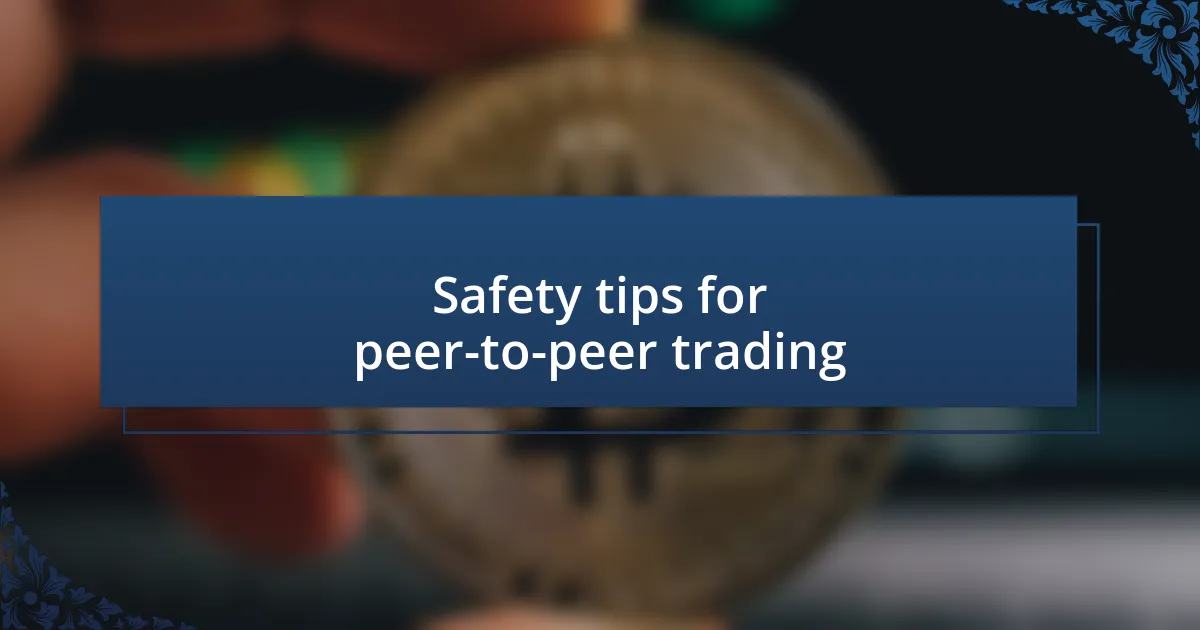
Safety tips for peer-to-peer trading
When it comes to safety in peer-to-peer trading, I always prioritize choosing a reputable platform. There was a time I overlooked this, thinking any site would suffice. A friend cautioned me, reminding me that a solid reputation often reflects strong security measures. So, I learned to read reviews and check for user ratings—it really pays off to do your homework.
I also emphasize clear communication with the trading partner. I’ve encountered situations where misunderstandings could have been avoided simply by confirming every detail before proceeding. For example, I once negotiated a trade and realized we both had differing expectations about payment timelines. Taking a moment to clarify can save a lot of potential hassle and build trust.
Lastly, never share sensitive personal information prematurely; I learned this lesson the hard way. During my early trades, I was quick to provide additional details out of eagerness. However, I now hold back on sharing specifics until I’m comfortable with the other party. A little caution can go a long way in ensuring a secure trading experience.

